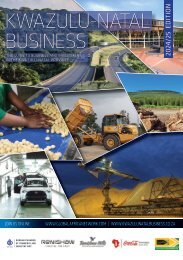KwaZulu-Natal Business 2016-17 edition
The 2016-17 edition of KwaZulu-Natal Business is the eighth issue of this highly successful publication that, since its launch in 2008, has established itself as the premier business and investment guide to the KwaZulu-Natal province in South Africa. The province is unique in terms of its abundant natural and human resources, and is also one of the key drivers behind the South African economy. To complement the extensive local, national and international distribution of the print edition of the magazine (15 000 copies), the full content can also be viewed online at www.kwazulunatalbusiness.co.za. Updated information on KwaZulu-Natal is also available through our monthly e-newsletter, which you can subscribe to online at www.globalafricanetwork.com, in addition to our other business-to-business titles that cover all nine provinces, complemented by our flagship publication, South African Business.
The 2016-17 edition of KwaZulu-Natal Business is the eighth issue of this highly successful publication that, since its launch in 2008, has established itself as the premier business and investment guide to the KwaZulu-Natal province in South Africa.
The province is unique in terms of its abundant natural and human resources, and is also one of the key drivers behind the South African economy.
To complement the extensive local, national and international distribution of the print edition of the magazine (15 000 copies), the full content can also be viewed online at www.kwazulunatalbusiness.co.za.
Updated information on KwaZulu-Natal is also available through our monthly e-newsletter, which you can subscribe to online at www.globalafricanetwork.com, in addition to our other business-to-business titles that cover all nine provinces, complemented by our flagship publication, South African Business.
Create successful ePaper yourself
Turn your PDF publications into a flip-book with our unique Google optimized e-Paper software.
Growing agri-business in KZN<br />
Agri-parks and trade agreements form the backbone of the province’s agricultural future,<br />
and will be instrumental in facilitating joint ventures between communities and investors.<br />
As South Africa continues to seek market access<br />
for agricultural products, an agreement<br />
with the US secured its position as an African<br />
Growth and Opportunity Act (AGOA)<br />
beneficiary.<br />
Through the AGOA agreement exports of agricultural<br />
goods are facilitated, although cheaper US<br />
chicken imports continue to threaten the local poultry<br />
industry. The <strong>KwaZulu</strong>-<strong>Natal</strong> Executive Council has<br />
identified key commodities such as red meat, chicken<br />
meat, dairy and dairy products, vegetables, dry beans<br />
and soya beans as focus commodities that have the<br />
potential to become self-sufficient industries and eventually<br />
enter the export market.<br />
In his 2015 budget address, Agriculture and Rural<br />
Development MEC Cyril Xaba stated that agriculture<br />
should be viewed as a business that extends across<br />
the entire food and agricultural chain, from farmers<br />
all the way through to consumers. The development<br />
of Agri-parks was proposed in a bid to attract new<br />
business opportunities and investors. An Agri-park is<br />
a networked innovation system of agro-production,<br />
processing, logistics, marketing, training and extension<br />
services, all of which is located within a District<br />
Municipality.<br />
A total of 10 Agri-parks are planned for <strong>KwaZulu</strong>-<br />
<strong>Natal</strong> at a cost of R45-million per park, and each will<br />
centre on the dominant commodity of the surrounding<br />
area. Agri-parks represent a 10-year programme and<br />
are envisaged to be fully functional by the year 2025.<br />
Farmer production as the primary unit<br />
A strong Agri-park base of primary production is necessary<br />
for the success of this initiative, and this will<br />
enable the parks to feed into the value chain and,<br />
in so doing, ensure participation in the agricultural<br />
economy by the Agri-parks. At present there are 321<br />
national rural development projects, 157 of which<br />
are concentrated in <strong>KwaZulu</strong>-<strong>Natal</strong>, and these cover<br />
7 235.5 hectares and total 5 446 small-hold farmers. At<br />
the ground level, these production sites will be controlled<br />
by various forms of enterprise that are owned<br />
by local producers, smallholder farmers and manufacturers,<br />
all of whom will hold shares in the Agri-parks.<br />
One such enterprise (and the first basic component<br />
of Agri-parks) is the South African Farmer<br />
Development Association (FPSU). As its name suggests,<br />
it aims to see growers develop from smallscale<br />
to larger operations and, in so doing, to find<br />
their place in the first economy. The FPSU is a rural<br />
small-holding farmer outreach and capacitybuilding<br />
unit that links with farmers and markets.<br />
The FPSU does primary collection and some storage,<br />
in addition to some processing for the local<br />
market, along with extension services such as<br />
mechanisation.<br />
In March <strong>2016</strong>, the Department of Rural<br />
Development and Land Reform (DRDLR) handed<br />
over R74.5-million towards addressing the needs<br />
of distressed small-scale growers. The agricultural<br />
economy can expect contraction as a result of the<br />
droughts this past year, and in KZN 153 000 farmers<br />
were affected by the drought, with 35 731 reported<br />
livestock losses.<br />
To date 4 750 farmers have been provided with<br />
assistance. Measures for farmer relief and recovery<br />
in the province started on 11 January <strong>2016</strong> and included<br />
feed and medicines to the value of R36-<br />
million, with R2.1-million in livestock water provided<br />
for the drilling and installation of boreholes, in so<br />
doing equipping 75 dams and drilling 62 boreholes.<br />
Importantly, the DRDLR has taken essential steps<br />
KWAZULU-NATAL BUSINESS <strong>2016</strong>/<strong>17</strong><br />
58


















